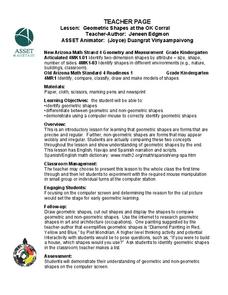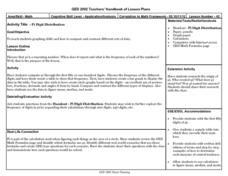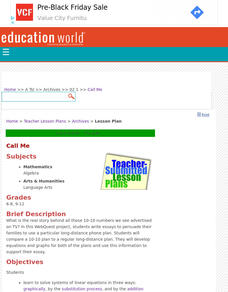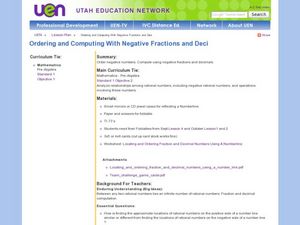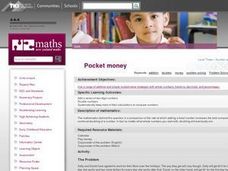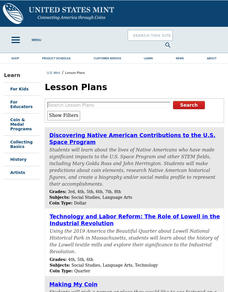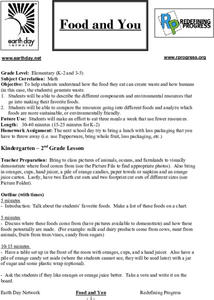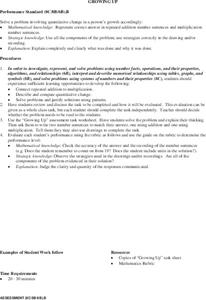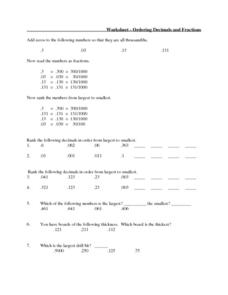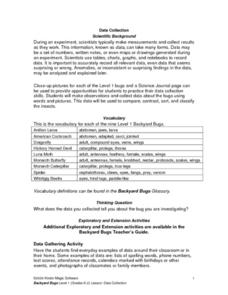Curated OER
Roman Toothpicks
Second graders make a chart comparing Roman numerals and our number system using toothpicks and construction paper. This clever lesson has students use toothpicks to create Roman Numeral translations for standard numbers.
Curated OER
Pardon me. Do You Have exChange for a Dollar?
Students are familiar with United States currency-dollar and cents. They are asked to compare it with currency of another country. Students explore currencies of various countries using the Internet, video, and hands-on activities. ...
Curated OER
100 More 100 Less
Third graders review the concept of place value and number sense. With a partner, they are given four cards with numbers on them. Using the cards, they practice making new numbers and completing addition and subtraction to find the...
Curated OER
Locating the Salt Front
Young scholars use Hudson River salinity data to create a line
graph that shows the location of the salt front, and use math
skills to explore how this location varies over time. They use the graph to estimate the location of the salt...
Curated OER
The Nature of Mathematics
Students work in groups to describe plants using numbers. In this number lesson, students use numbers to define plants and then use numbers to write descriptions of themselves.
Curated OER
Geometric Shapes at the OK Corral
Students explore geometric shapes. In this math lesson, students identify geometric and non-geometric shapes using the computer. Students research geometric shapes in art and architecture.
Curated OER
Pi Digit Distribution
Students study graphing skills and compare and contrast data sets. They compute pi through the first 50-100 digits and create a bar graph showing the frequencies of specific digits.
Curated OER
Prints and Outlines
Students determine the area of two objects by superimposing one on the other. They compare and order the area of different shapes by covering a larger shape with similar smaller ones. They complete these activities as different stations.
Curated OER
Call Me
Students write essays to persuade their families to use a particular long-distance phone plan. They compare a 10-10 plan to a regular long-distance plan.
Curated OER
Charting Attendance Rate of Busch Gardens
Sixth graders, in groups, are given different parts of the whole project. They use information from Busch Gardens to explore line graphs, averages, and other math vocabulary.
Curated OER
Area graphics for 7th graders
Students randomly select dimensions for three geometric shapes (square, right triangle and circle). From the graphs they compare and contrast the graphical results of each shape.
Curated OER
Ordering and Computing with Negative Fractions and Decimals
Seventh graders explore the concept of computing negative fractions and decimals. In this negative fractions and decimals instructional activity, 7th graders compare ordering positive fractions to ordering negative fractions. Students...
Curated OER
Pocket Money
Students discover that the mathematics behind this question is a comparison of the rate at which adding a fixed number increases the total compared to continual doubling of a number. In fact no matter what whole numbers you start with,...
Curated OER
Mathematics Within: Algebraic Patterns
Pupils discover patterns in linear equations by playing a dice game to collect data. They graph the data and analyze the patterns of the lines created by the data. The class then compares the individual graphs to evaluate the position of...
Curated OER
The Box with the Greatest Volume
Students use measurement tools to measure the nearest 16th of an inch. They connect fractions and their decimal equivalents and compare this with other decimals. Finally, the class uses algebraic concepts and formulas to solve problems.
Pennsylvania Department of Education
Seeing Doubles
Students work with dominoes to recognize the number of spots on each side as they relate to addition facts. In this seeing doubles lesson, students make triangle shaped flash cards for the double facts. Students represent the correct...
Curated OER
The Many Faces of Coins
Pupils examine and discuss the designs on the circulating coins produced by the United States Mint. They read about the woman and child featured on the Golden Dollar. They compare and contrast coins using a Venn Diagram.
Curated OER
Food and You
Students examine the types of foods they eat. They describe the different components and resources that go into making their favorite foods. They also compare the resources going into different foods and identify ones which are more...
Curated OER
Water Use Around the World
Pupils compare their water use with other places around the world. They calculate the amount of water they use in a week and discuss how to conserve water. They discover the amount of clean water throughout the world.
Curated OER
Growing Up
Students solve a given problem and explain their thinking using two number sentences to match their answer. One number sentence must use addition, one must use multiplication, and students must explain their answers. Includes sample...
Curated OER
One Square Meter
Students examine various ecosystems using scientific inquiry. Using the local area, they assess the characteristics and conditions in one square meter. They report their findings in the form of a survey map and data sheet. They...
Curated OER
Ordering Decimals and Fractions
In this math worksheet, students follow the directions on the page to learn how to compare decimal and fractional numbers. Students answer 7 questions.
Curated OER
Make Your Own "Weather" Map
Young scholars create their own "weather" map using data from x-ray sources. They analyze and discuss why it is important to organize data in a fashion in which is easy to read. They compare and contrast different x-ray sources using a...
Curated OER
Science: Backyard Bugs Data Collection
Students practice data collection skills by observing common bugs found in their local environment. Once the data is collected they complete data sheets to compare, contrast, sort, and classify the insects. The lesson includes...







